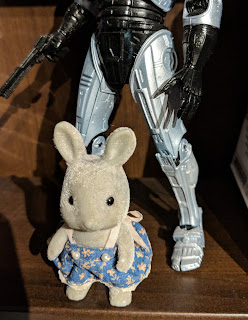Book Blogger Hop Nov 12
This weeks Book Blogger Hop is twofold: a challenge and a question. I sadly have to admit that, while I put several new blogs on my reading list last Friday, and have read their posts this week in my RSS feed, I was very busy with work last weekend and Monday. Since then I have been catching up on other tasks (cleaning the apartment, formatting Facsimile (see sidebar) for ePub...) and didn't post five comments on any one blog. Ah well. I'll stick to my tactic of only commenting when I really have something to day, I guess. ;)
Now today's question:
"If you find a book that looks interesting but is part of a series, do you always start with the first title?"
I am fairly inconsistent about this, actually. Sometimes I am stubborn about reading the first book first, or reading all the books in a series. For example, I own all of Fleming's James Bond novels because I was reading them in order from the library and I just could not get the library to send me a copy of The Spy Who Loved Me, even though I'd been trying for months. So I broke down and bought that one and a couple more, and then I fell subject to collection sickness and had to get them all.
On the other hand, a mass market paperback that I just happen upon in the library I might try out regardless of whether it's the first one, and decide later whether I want to backtrack. That's how I read When The Tide Rises by David Drake, although I didn't like it enough to track down the earlier books.
Or if the most famous book in a series is in the middle, and I don't intend to read them all, I might jump around. When I was getting into classic noir, I read The Long Goodbye first, and then ended up going back to read all of Chandler's Marlowe books. This is usually a good tactic for books that can stand alone, but are tied together by a character or world.
That's another good point actually. I used to always read series and not mind plots that might not get resolved until the end of the trilogy or what-have-you, but nowadays I tend to prefer books that either can stand alone or be part of a series.


Interesting! I think you're the first blogger I've come across who doesn't care that much about reading series books in order. I've got a little OCD and HAVE to read them in order. I seriously can't NOT do it. Crazy, huh?
ReplyDeleteGlad to have found you via the Hop!
You're braver than I am - I always worry about not starting at the beginning! I'm too type-A to hop around I suppose!
ReplyDeleteHave a good weekend!
My Hop
Hi Darcy,
ReplyDeleteI think you're getting into something interesting now, which is the question of author's intent vs. effect on the reader. I do read many series in order, but there are those (like Discworld) in which many books aren't connected enough for it to be an issue, and those in which the order is in question. Take Chronicles of Narnia, for a classic example: there is plenty of unresolved debate whether it is more effective for a reader to read them in the order in which they were written or the order in which the events occur. The author's intent seems to be confusing: Lewis has been cited approving of chronological publication orders, but many scholars and readers argue for publication order, and that is the order they were originally conceived in.
Long-running series in which prequels are written later are another example, and then you have the occasional series like Dark Tower! I've read both versions of the first book. I really liked the original version, but I also understand that King wanted to go back and revise it to make it fit better with the later books. Not sure quite what I'd recommend to a new reader of the series, though.
(And then of course there are comic books, in which reading from the beginning makes no sense, given how often the 'past' is revised in the current stories and how often the author changes... but that's a whole other question.)
Sorry for the rambling... I just love to think about these things.
Cheers!
Also: Hi Susan and Christin!
ReplyDeleteAnd Howard: Yes, exactly: some series are more closely linked than others.